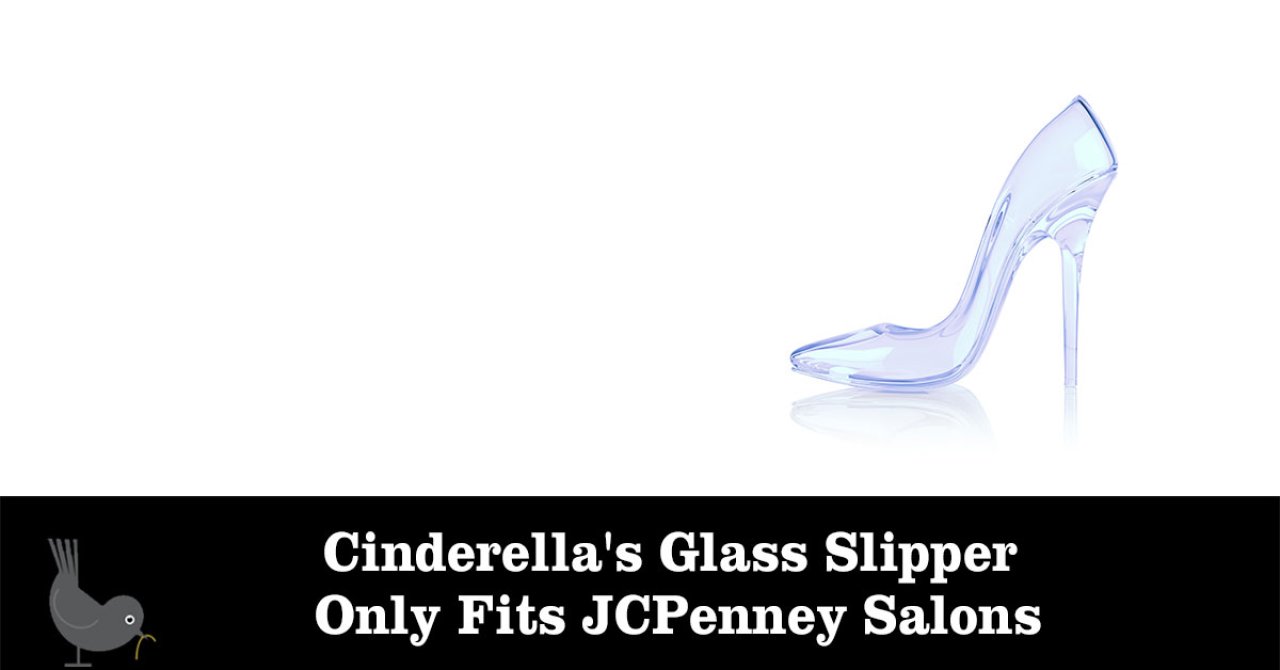Cinderella's Glass Slipper Only Fits JCPenney Salons

The last time we checked, there were still only one hundred pennies in a dollar.
In business, if you spend less than one hundred pennies of every dollar, you have profit. If you spend more than one hundred pennies you have negative profit and lose money.
At salons and spas, the largest single expense will always be service payroll. And like any expense, payroll costs must be controlled in order to be sustainable.
About fifty years ago, the professional beauty industry got itself into trouble when creative stylists began opening salons without the know how to design compensation systems or manage finances and cash flow.
Commission was the no-brainer go-to compensation system of choice.
What could be simpler than paying a stylist a percentage of what they bring in? Commission will motivate them to build their clientele. And what could be more super simpler than a 50/50 commission split? No one gets paid unless they ring up a sale.
But going with super-simple commission had a downside that has manifested itself into the business nightmares that have plagued salons, and now spas, for decades.
- The pirating of busy stylists with higher commission rates has risen to an art form. "Bring your clientele to my salon/spa and I'll pay you 55% or 60% … or 70% commission." It's like the rule of one hundred pennies in a dollar never existed.
- Every owner fears the dreaded "staff walkout". There is nothing more devastating than seeing years of hard work relocate down the street to get a few more pennies of every dollar "they" bring in by servicing "their" clients. For owners, it no longer sounds like, "If I build it … they will come." It sounds like, "If I build them … they will leave."
- As commissions and operating costs increased … product-cost deductions came in. It's a super-simple fix to lower a super-simple commission rate that was too high to begin with. Take ten percent off the top and then apply the commission rate. Take away the smoke and mirrors and product-cost deductions are simply a way to lower commission rates.
- Tracking individual "request rate" was always the wrong growth indicator. There's a massive difference between "building columns on your appointment book" and building a sustainable salon/spa business, culture and brand. Telling them to build "their" request rate is creating client loyalty to a column on your appointment book - not your company and brand. Request tracking should be renamed … "Your Walkout Factor."
JCPenney's Project Cinderella … and what's wrong with it
JCPenney recently launched its Project Cinderella in over 800 of its stores. They offer zero rental or supply fees, and commissions beginning for stylists at 50% and up to 70% commissions for top-producing master stylists.
Natalie Lockhart, vice president of JCPenney salons, told Modern Salon, "The new commission structure is an employment and compensation program that offers senior stylists the benefits of an employment position, with the flexibility and earning potential of an independent salon operator."
The lineup of incentives for eligible Project Cinderella associates include:
- Flexible scheduling. Stylists are permitted to set their own schedules.
- The option to establish individual service pricing.
- Up to 70% commission based on performance.
- Stylists are part of the JCPenney team, which entitles eligible associates to medical and dental insurance, paid time off, associate discount and a 401K-retirement plan.
- Free education. Learning is essential to professional growth and JCPenney offers comprehensive advanced education programs.
Why JCPenney's Project Cinderella only works for JCPenney
- JCPenney operates salons within their stores: JCPenney didn't figure out how to squeeze thirty to thirty five more pennies out of each dollar. Because JCPenney salons are located inside JCPenney stores, the rent factor is essentially a non-issue. Not so with salons and spas that lease or own space.
- JCPenney buys direct from major manufacturers: Professional product and retail costs are significantly lower than any deal independent salons and spas could ever dream of getting. If you had 800+ salons … you too could negotiate heavily on price, training and support.
- JCPenney wants salon traffic walking through their stores: This is super-simple to understand. An in-store salon makes sense for JCPenney. And the JCPenney salons aren't located at the main entrance. The salons are purposely located so clients must walk through the store, often to a different floor, to find the salon. For JCPenney, the salon is just as much a marketing and traffic generating entity, as it is a revenue department. Why not pay high commissions if their salons attract regular shoppers?
- JCPenney is simply jumping on the "independent salon operator" bandwagon: Because of the company's economy of scale and existing benefit programs, it is able to offer a crazy high commission structure to attract and keep stylists. FACT: Department stores are fighting for their survival. Macy's is closing stores. Sears, that also owns Kmart, just told stockholders that there is "substantial doubt" it can remain in business.
Commission rates at the JCPenney salons are the least of the company's troubles.
According to January 2017 CNBC report, just one week after Macy's and Sears detailed the upcoming closures of a combined 218 stores, Cowen and Company analyst Oliver Chen said that Penney's could ultimately chop its count by some 30 percent. Such a move would leave the chain with roughly 700 locations. That means JCPenney salons will close too along with those high commissions. So much for Cinderella's glass slipper.

Here's my challenge to you: PLEASE, don't look at JCPenney's new business model and commission structure as a model to emulate in your company. The media coverage paints a beautiful picture of enticing commission rates, benefits and set your own hours and prices. What isn't being factored in is the JCPenney Company's financial reality and gloomy future of downsizing and possible extinction.
- Remember, there are one hundred pennies in a dollar. Profit means spending less than one hundred pennies.
- Remember, your salon/spa is a service business … not a major department store.
Remember, department stores are fighting extinction. Salons and spas are not.


Comments
No comments found. Start the conversation!
Leave a Comment